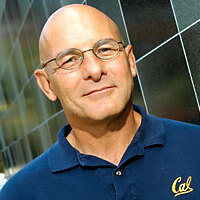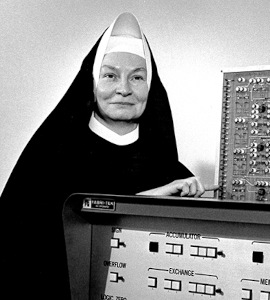
Computer Go is the field of artificial intelligence (AI) dedicated to creating a computer program that plays the traditional board game Go. The field is sharply divided into two eras. Before 2015, the programs of the era were weak. The best efforts of the 1980s and 1990s produced only AIs that could be defeated by beginners, and AIs of the early 2000s were intermediate level at best. Professionals could defeat these programs even given handicaps of 10+ stones in favor of the AI. Many of the algorithms such as alpha-beta minimax that performed well as AIs for checkers and chess fell apart on Go's 19x19 board, as there were too many branching possibilities to consider. Creation of a human professional quality program with the techniques and hardware of the time was out of reach. Some AI researchers speculated that the problem was unsolvable without creation of human-like AI.

David Andrew Patterson is an American computer pioneer and academic who has held the position of professor of computer science at the University of California, Berkeley since 1976. He announced retirement in 2016 after serving nearly forty years, becoming a distinguished software engineer at Google. He currently is vice chair of the board of directors of the RISC-V Foundation, and the Pardee Professor of Computer Science, Emeritus at UC Berkeley.

James Reginald Cordy is a Canadian computer scientist and educator who is Professor Emeritus in the School of Computing at Queen's University. As a researcher he is most recently active in the fields of source code analysis and manipulation, software reverse and re-engineering, and pattern analysis and machine intelligence. He has a long record of previous work in programming languages, compiler technology, and software architecture.
Robert Morgan Hyatt is an American computer scientist and programmer. He co-authored the computer chess programs Crafty and Cray Blitz which won two World Computer Chess Championships in the 1980s. Hyatt was a computer science professor at the University of Southern Mississippi (1970–1985) and University of Alabama at Birmingham (1988–2016).

Charles Eric Leiserson is a computer scientist and professor at Massachusetts Institute of Technology (M.I.T.). He specializes in the theory of parallel computing and distributed computing.

Barbara Liskov is an American computer scientist who has made pioneering contributions to programming languages and distributed computing. Her notable work includes the introduction of abstract data types and the accompanying principle of data abstraction, along with the Liskov substitution principle, which applies these ideas to object-oriented programming, subtyping, and inheritance. Her work was recognized with the 2008 Turing Award, the highest distinction in computer science.
Michael Randolph Garey is a computer science researcher, and co-author of Computers and Intractability: A Guide to the Theory of NP-completeness. He and Johnson received the 1979 Frederick W. Lanchester Prize from the Operations Research Society of America for the book. Garey earned his PhD in computer science in 1970 from the University of Wisconsin–Madison. He was employed by AT&T Bell Laboratories in the Mathematical Sciences Research Center from 1970 until his retirement in 1999. For his last 11 years with the organization, he served as its director. His technical specialties included discrete algorithms and computational complexity, approximation algorithms, scheduling theory, and graph theory. From 1978 until 1981 he served as Editor-in-Chief of the Journal of the Association for Computing Machinery. In 1995, Garey was inducted as a Fellow of the Association for Computing Machinery.
Zobrist hashing is a hash function construction used in computer programs that play abstract board games, such as chess and Go, to implement transposition tables, a special kind of hash table that is indexed by a board position and used to avoid analyzing the same position more than once. Zobrist hashing is named for its inventor, Albert Lindsey Zobrist. It has also been applied as a method for recognizing substitutional alloy configurations in simulations of crystalline materials. Zobrist hashing is the first known instance of the generally useful underlying technique called tabulation hashing.
William F. "Bill" Opdyke is an American computer scientist and enterprise architect at JPMorgan Chase, known for his early work on code refactoring.

Board representation in computer chess is a data structure in a chess program representing the position on the chessboard and associated game state. Board representation is fundamental to all aspects of a chess program including move generation, the evaluation function, and making and unmaking moves as well as maintaining the state of the game during play. Several different board representations exist. Chess programs often utilize more than one board representation at different times, for efficiency. Execution efficiency and memory footprint are the primary factors in choosing a board representation; secondary considerations are effort required to code, test and debug the application.

Edmund Melson Clarke, Jr. was an American computer scientist and academic noted for developing model checking, a method for formally verifying hardware and software designs. He was the FORE Systems Professor of Computer Science at Carnegie Mellon University. Clarke, along with E. Allen Emerson and Joseph Sifakis, received the 2007 ACM Turing Award.

Ronald Fagin is an American mathematician and computer scientist, and IBM Fellow at the IBM Almaden Research Center. He is known for his work in database theory, finite model theory, and reasoning about knowledge.
Shang-Hua Teng is a Chinese-American computer scientist. He is the Seeley G. Mudd Professor of Computer Science and Mathematics at the University of Southern California. Previously, he was the chairman of the Computer Science Department at the Viterbi School of Engineering of the University of Southern California.
Johannes Gehrke is a Technical Fellow at Microsoft focusing on AI. He is an ACM Fellow, an IEEE Fellow, and he received the 2011 IEEE Computer Society Technical Achievement Award and the 2021 ACM SIGKDD Innovation Award. From 1999 to 2015, he was a faculty member in the Department of Computer Science at Cornell University, where at the time of his leaving he was the Tisch University Professor of Computer Science.
Informatics is the study of computational systems. According to the ACM Europe Council and Informatics Europe, informatics is synonymous with computer science and computing as a profession, in which the central notion is transformation of information. In some cases, the term "informatics" may also be used with different meanings, e.g. in the context of social computing, or in context of library science.
Harry Lewis Nelson was an American mathematician and computer programmer. He was a member of the team that won the World Computer Chess Championship in 1983 and 1986, and was a co-discoverer of the 27th Mersenne prime in 1979. He also served as editor of the Journal of Recreational Mathematics for five years. Most of his professional career was spent at Lawrence Livermore National Laboratory where he worked with some of the earliest supercomputers. He was particularly noted as one of the world's foremost experts in writing optimized assembly language routines for the Cray-1 and Cray X-MP computers. Nelson had a lifelong interest in puzzles of all types, and founded the MiniMax Game Company, a small venture that helps puzzle inventors to develop and market their products.
Michael David Mitzenmacher is an American computer scientist working in algorithms. He is Professor of Computer Science at the Harvard John A. Paulson School of Engineering and Applied Sciences and was area dean of computer science July 2010 to June 2013. He also runs My Biased Coin, a blog about theoretical computer science.
In computer science, tabulation hashing is a method for constructing universal families of hash functions by combining table lookup with exclusive or operations. It was first studied in the form of Zobrist hashing for computer games; later work by Carter and Wegman extended this method to arbitrary fixed-length keys. Generalizations of tabulation hashing have also been developed that can handle variable-length keys such as text strings.

Mary Kenneth Keller, B.V.M. was an American Catholic religious sister, educator and pioneer in computer science. She was the first person to earn a Ph.D. in computer science in the United States. Keller and Irving C. Tang were the first two recipients of computer science doctorates.
James Robert Slagle was an American computer scientist notable for his many achievements in Artificial Intelligence. Since 1984 he has been the Distinguished Professor of Computer Science at the University of Minnesota, Minneapolis, with former appointments at Johns Hopkins University, the National Institutes of Health, the Naval Research Laboratory, Lawrence Livermore Radiation Laboratory, University of California, Berkeley, and the Massachusetts Institute of Technology.








